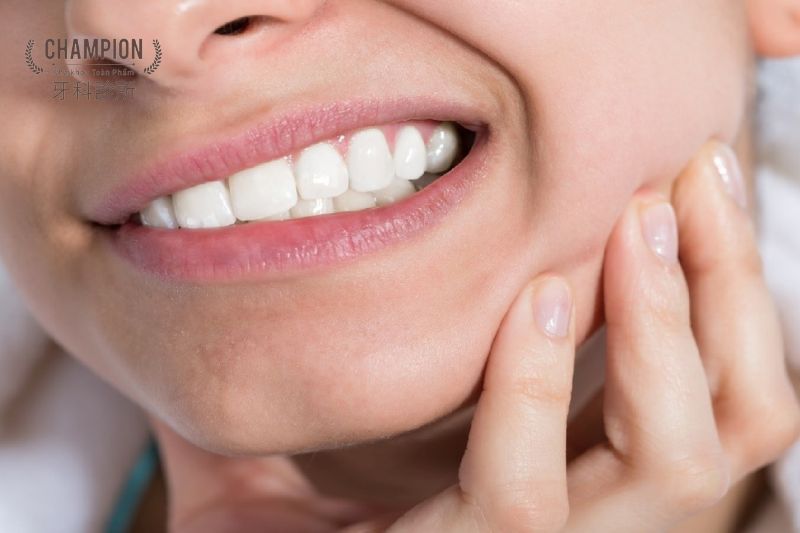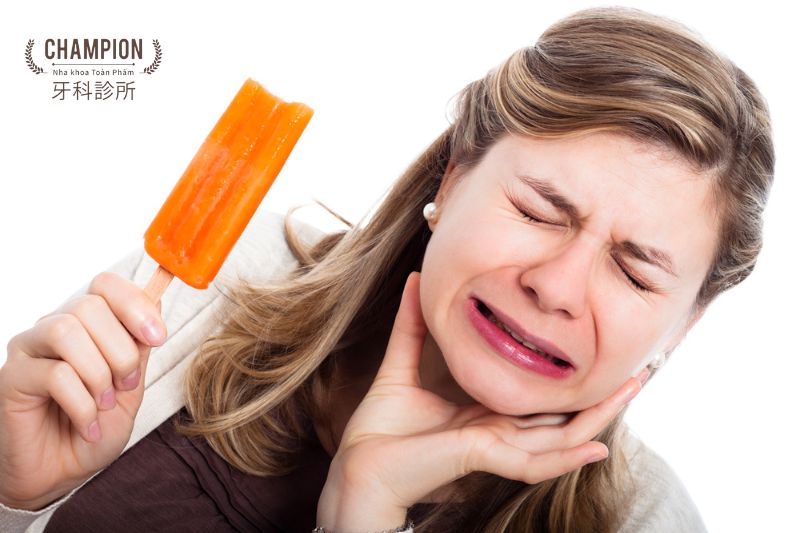Sensitive Teeth is a common oral health issue that many people experience. When teeth are sensitive, often, every time you breathe through your mouth or come into contact with cold, hot, sweet, or sour foods, you may feel a sharp, painful sensation and discomfort. This condition can seriously impact your quality of life and hinder your ability to eat and care for your teeth.
What is Sensitive Teeth?
Sensitive Teeth, often referred to as "toothache," is a common issue in the field of dentistry, causing discomfort and unease for those who experience it. This phenomenon typically occurs when individuals perceive pain or a tingling sensation upon contact with something of extreme hot or cold temperatures, and even when interacting with stimuli such as food and beverages.
Sensitive Teeth stems from the erosion or damage of tooth enamel, rendering this protective outer layer less effective. When tooth enamel is worn down, the nerve tubules within the tooth become exposed to various pain-inducing factors, such as contrasting temperatures. This results in sensations of tingling or pain when eating, touching the teeth, or encountering substances with extreme hot or cold temperatures.

Common Signs of Sensitive Teeth
Sensitive Teeth often arise due to enamel erosion or gum recession and is typically experienced by individuals between the ages of 20 to 50. To determine if you are experiencing this condition, pay attention to the following signs and symptoms:
- You may feel pain or a tingling sensation while consuming food and beverages, especially when they are hot, cold, sweet, or sour. These stimuli can trigger discomfort and create an unpleasant sensation.
- When you touch your teeth with your finger or a toothbrush, you may experience pain or a dull ache.
- Brushing your teeth can also induce sensitivity or a tingling feeling.
- Foods or drinks with a low pH (acidic) or high sugar content (sweet) can make you feel as though your teeth are being jabbed.

Causes of Sensitive Teeth
Sensitive Teeth is a common dental condition and can be attributed to various factors. Below are some common causes of Sensitive Teeth:
Consuming Acidic Foods
Regularly consuming foods with high acid content, such as pickles, mangoes, oranges, tomatoes, and sour candies, can lead to enamel erosion. To mitigate the impact of acid, consider eating a piece of cheese or drinking milk immediately after consuming such foods.
Using a Hard-Bristled Toothbrush
Brushing teeth vigorously or using a toothbrush with hard bristles can damage the gums and expose the sensitive dentin layer of the teeth. Teeth become sensitive when they come into contact with stimulating factors, such as eating or brushing.
Cracked or Fractured Teeth
Teeth can become cracked or fractured due to activities like chewing ice, biting hard candies, or experiencing accidents or trauma. When a tooth is cracked, the nerve endings within the tooth can be stimulated during chewing, causing a sharp, painful sensation. Additionally, cracks can harbor bacteria, leading to inflammation and further discomfort.
Tooth Decay
Tooth decay results in deep cavities within the teeth. When these cavities reach the dental pulp, the nerve endings inside can be stimulated, leading to pain and sensitivity. To prevent tooth decay, maintain good oral hygiene, eat properly, and visit the dentist regularly for check-ups and deep cleanings if necessary.
Gum Recession
The roots of teeth are covered by gum tissue. If you have gum problems, the gums may recede, exposing the sensitive dentin underneath. To address gum recession, it's essential to consult a dentist for timely advice and treatment.
Teeth Grinding (Bruxism)
While tooth enamel is the hardest tissue in the body, it can wear down over time due to habits like teeth grinding. To protect enamel and prevent teeth from becoming sensitive, it's advisable to limit such behaviors.

Effective Tips for Preventing Sensitive Teeth
Sensitive Teeth can not only cause discomfort but also significantly impact your daily quality of life. However, with simple preventive measures, you can protect your teeth from this condition.
- Make it a habit to brush your teeth at least twice a day using toothpaste designed for sensitive teeth to safeguard your tooth enamel.
- Opt for a toothbrush with soft, gentle bristles and brush your teeth in a circular motion. Avoid brushing horizontally to prevent damage to the enamel.
- If your toothbrush bristles start to fray, replace it promptly to maintain effective cleaning.
- Avoid excessive consumption of sugary foods, carbonated beverages, and acidic items like citrus fruits, tomatoes, pickles, mangoes, and sour candies.
- Schedule routine dental appointments to ensure you have an understanding of your oral health status and receive necessary guidance from your dentist.
>> See more: Gingivitis: Symptoms, Causes and Prevention Measures
Always prioritize your oral health and follow preventive measures to avoid Sensitive Teeth, ensuring a healthy and comfortable smile. If you encounter any dental issues, don't hesitate to reach out to Champion Dental Clinic for dedicated support and care.
Vietnamese & English: (028) 5411-2295
中文: (028) 5411-2297 172 Nguyen Luong Bang, Tan Phu Ward, District 7, Ho Chi Minh City.
Fanpage: Champion Dental Clinic 牙科診所
Zalo: Champion Dental Clinic
Youtube: Champion Dental Clinic 牙科診所
 Champion Dental Clinic
Champion Dental Clinic



